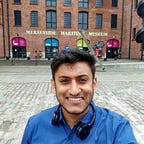My first research internship
In 2017, I was in my sixth semester and after wrapping up 2 internships at 2 different startups, I wanted to see what challenges the research world offers. This blog post documents the trials and tribulations I had to face to pursue a research internship under Dr. Vitaly at the University of Liverpool.
Initially, I started rolling out emails to professors of all domains: Computer Networks, Algorithms and Data Structures, Image Processing, etc. Getting no response from over hundred professors was a signal that I was doing something wrong. You have no control over the outcomes, but you can change the process that led to those outcomes — and hence I started analysing my emails and following is what I found: -
- I was drafting generic emails.
- My profile stuck out like a sore thumb: Though I had good amounts of development experience, my profile had negligible research experience.
I consulted my friend Prastut Kumar, who advised me to expand my search space by not only focusing on professors but also focusing on post-docs and researchers working under these professors. His insight was that usually, the senior professors have hectic schedules involving getting grants, mentoring post-docs and researchers, and multiple teaching positions. Replying to you your email would be on the least priority. Rather writing specific tailor-made emails to post-docs and researchers will have a higher yield because they have more skin in the game than the professor mentoring them and since there are only 24 hours in a day, a coder who can offset their development time cost is super useful to them than the professor who is mentoring them.
This set me in the right direction → my emails became personalized and contextualized with the researcher’s work and results starting to kick in. I was soon getting replies and discussions began around possibilities of inviting me to their research labs.
Out of all those discussions, I finally got a confirmation from Dr. Vitaliy Kurlin who invited me for an on-site internship to work on Mapper Algorithm in the University of Liverpool. During my interviews, I was tested for my proficiency in C++ and in Python and was finally given an offer.
On my first visit to the University of Liverpool, Dr. Kurlin graciously invited me for lunch at the Victoria Gallery & Museum. He was quick to break the ice by asking about India’s cultural diversity and I was made to feel at home. After having a scrumptious lunch, I was raring to go. Since I didn’t have any prior research experience, the stakes were high and I had to prove myself at all costs. Post lunch, we discussed the project and my role in it. I was told that if I improve the visualization of the Mapper algorithm and implement it in C++, the job’s done.
I began to study the already implemented version of the algorithm in Python. It was difficult at first: so much of theoretical aspects were new to me. I had imagined that I was going to code 24*7, but here I was reading research papers and journals. In the beginning, it felt boring but slowly the advantages started to unravel and after a week or two, I had started executing on the optimization part of the algorithm. I was glad that my previous experience in development was getting put to test. I won’t enter a lot of technical aspects of the project but I have jotted down a few takeaways:
- Extending the existing libraries wherever possible
- Objectifying the problem: I improved my ability to simplify the problem statement before coming up with a more complex solution(this helped me in interview programming as well)
- Lots of iteration for tuning the right data structure made me understand Zuckerberg’s quote: Move fast and break stuff.
- Noting metrics from each component of software that I had built: the complexity of any algo, output quality, etc
From cooking my own food to getting inspired by the Brits in getting more disciplined with my time, I guess it was all easy since I had one motive in my mind: to get shit done! In the end, I would like to thank Dr. Vitaliy for giving me an exponential learning curve and my teammate Falgun Patel.
Since I have had a lot of help from others, I am ready to help out anyone in any sort of suggestions needed for internships. Reach out to me at my email.
In the end, thank you so much Dr. Vitaliy and my teammate, Falgun Patel.
